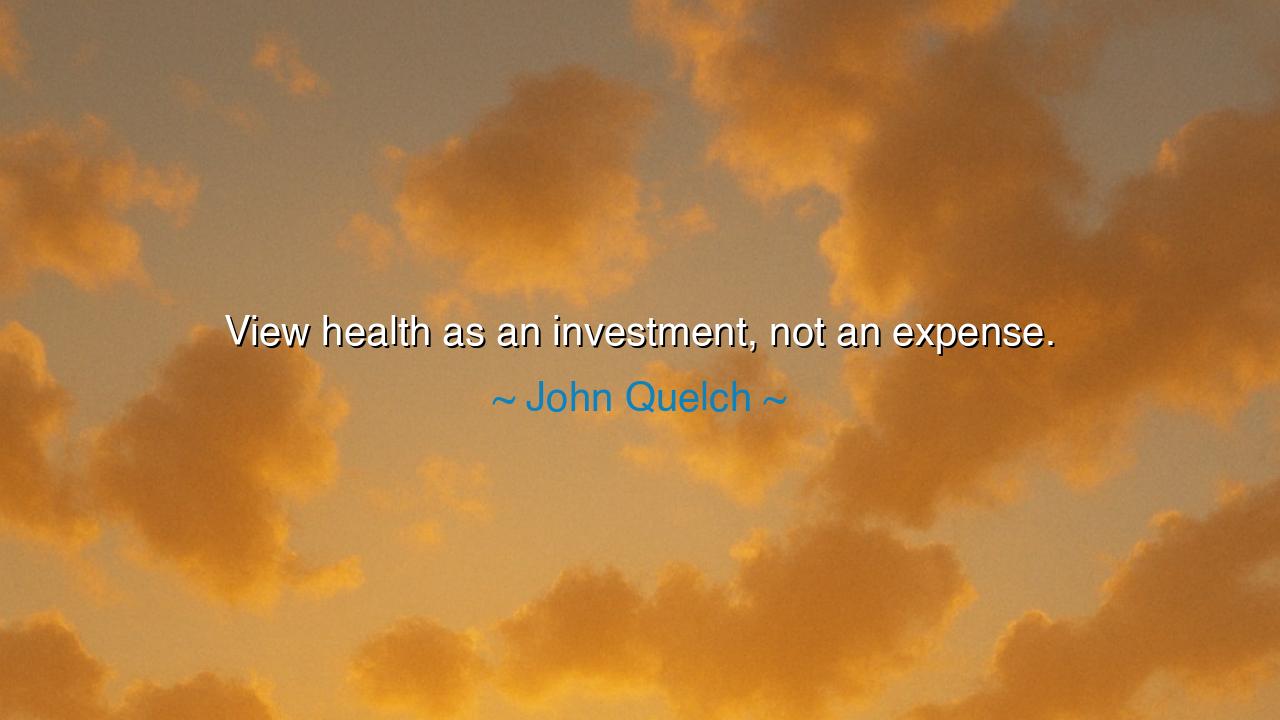
View health as an investment, not an expense.






The words of John Quelch, “View health as an investment, not an expense,” shine with the simplicity of truth and the gravity of wisdom. They are a reminder that health is not a luxury to be afforded when convenient, nor a burden to be minimized—but the very foundation upon which all endeavor stands. In every age, men have labored to build wealth, power, and legacy, yet too often they have forgotten that without the strength of body and clarity of mind, all riches turn to dust. Quelch’s words are a call to reawaken our understanding that well-being is capital, not cost—that every act of care we give to our bodies and minds yields the highest return: the gift of life itself.
In ancient times, philosophers and healers alike spoke of this sacred truth. The Greek sage Hippocrates declared that the wise man should consider health the greatest blessing of human life. In the East, the masters of balance and breath taught that harmony in the body leads to harmony in the spirit. To them, illness was not simply the result of disease, but of neglect—of failing to honor the temple that carries the soul. Quelch, speaking in the language of modern commerce, revives this ancient lesson for a world that measures too much in numbers and too little in meaning.
The origin of this quote lies in the study of behavior, economics, and the patterns of human neglect. As a scholar of business and leadership, John Quelch saw how societies and individuals often treat healthcare as a cost to minimize, rather than an asset to cultivate. Companies cut safety measures to save money; individuals delay medical visits to avoid bills; nations spend fortunes curing disease instead of preventing it. Through this lens, Quelch’s statement becomes both a critique and a revelation: that the failure to invest in health—physical, mental, and communal—is the truest form of poverty.
Consider the story of Florence Nightingale, the “Lady with the Lamp.” In the blood-soaked hospitals of the Crimean War, she witnessed men dying not from wounds, but from filth and infection. With discipline, data, and compassion, she reformed the sanitation systems, transforming chaos into order. Her belief that prevention is better than cure—that every life saved through cleanliness and care was worth more than any fortune—changed the course of modern medicine. Nightingale saw health as investment: an investment in soldiers, in nations, in humanity itself. Her light still burns in every hospital ward where compassion meets science.
Health as investment also extends beyond the individual to the moral structure of society. When a nation builds hospitals instead of prisons, supports the weak instead of exploiting them, educates its people on wellness instead of selling them decay—it invests not only in health, but in peace, productivity, and collective strength. To neglect health is to rob the future. To cultivate it is to sow the seeds of progress. The wealth of a nation is measured not in gold reserves or factories, but in the vitality of its people—their energy, their creativity, their capacity to dream and to serve.
Yet this truth begins not with governments, but within each heart. The man who skips rest for profit, the woman who silences her pain for duty, the youth who mistakes exhaustion for success—all commit the same error: treating the body as a machine, not a companion. Health must be tended like a garden—patiently, daily, and with reverence. Exercise is not punishment but gratitude. Nutrition is not deprivation but wisdom. Rest is not laziness but renewal. In this way, we transform our days from endless labor into sacred stewardship of life.
The lesson is clear: to invest in health is to invest in every dream we cherish. The time we spend caring for our bodies, nurturing our minds, and finding balance is not time lost—it is time multiplied. Just as a farmer sows seeds to reap abundance, so too must we plant daily acts of care to harvest years of strength and clarity. The one who tends his health tends his destiny.
So let these words endure as an eternal reminder: health is the true wealth. Guard it not as one guards coins, but as one guards breath. Build it, cherish it, and share it. For the legacy of a well-lived life is not in possessions or titles, but in the strength to love, to create, and to continue—radiant, whole, and undiminished by the years.






AAdministratorAdministrator
Welcome, honored guests. Please leave a comment, we will respond soon